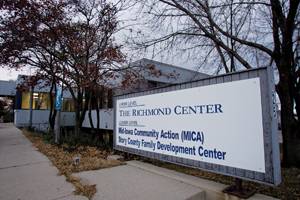Center, facing foreclosure, asks Ames for financial help

The Richmond Center at 125 S. 3rd St. #200. Photo: Jon Lemons/Iowa State Daily
November 6, 2008
The Richmond Center, 125 S. 3rd St. #200, met with the Ames City Council on Nov. 6 to make its plea to save the mental health services of Ames.
The City Council voted unanimously in approval of the funds. The city currently has a contract with the center to supply funds for the crisis line and other services. However, these funds are currently not enough to keep it open.
Amid the discussion were several testimonies of the impact the Richmond Center has on the community and the importance of the services it offers.
The Richmond Center currently needs $178,000 to keep its doors open. It announced to the City Council that if it does not receive these funds it will be forced to close within the next 30 days.
In addition to the city of Ames, the center has also asked United Way and Story County to contribute. Representatives of both the United Way and Story County were present at the City Council meeting. The county has not yet decided on whether to help with the funding. The United Way said it would be willing to support the center.
The focus of the meeting was not on saving the center, but rather about the continuing need of mental health services in Story County and the surrounding areas. Several speakers from the center said it was too late to save. The goal in funding the center is to keep supplying services to its clients long enough for a business merger with Community and Family Resources, 1619 S. High Ave., to take effect.
The merger with Community and Family Resources is a long-term goal. The organization is not currently accredited for mental health services. Because of this, keeping the Richmond Center open is important if these services are to continue in the city of Ames.
The merger is designed to offer better services for current clients. The Richmond Center cannot complete the merger unless they are financially sound. The center reflected on past mistakes and is making changes to correct them. They are currently trying to sell their building to help with the debt. The center also has plans to reduce staff once they are apart of Community and Family Resources.
There would be a significant long term negative effect on the community and Iowa State if the Richmond Center were to close its doors. One thousand two hundred people would be affected, said a county official.
A spokesperson form the center argued, that if it closed, patients would have to turn to other sources for help if they turn to anyone at all. She said the result would cause strain on the hospital and local police. Closing would also cause many people who work at the center to be unemployed, she said.
Story County Supervisor Jane Halliburton said this kind of situation is not uncommon in Iowa. She said more and more mental health facilities are forced to close down because of problems recruiting psychiatrists and because Iowa has one of the lowest rates of Medicaid reimbursement in the nation.
“Mental health services in this state are failing our citizens,” said Brian Dieter, board officer for the United Way of Story County.
The Richmond Center has not only supplied help to clients in Story County, but has clients from other counties as well.
The resources for mentally ill people are becoming more limited. Ames City Council is looking into possibly partnering with surrounding communities and counties to make sure these services don’t disappear completely.
Marilyn Paplow, advanced nurse practitioner for the center, told the Council that the Richmond Center makes a difference. She said they reach out to people before things fall apart.
One of the center’s clients also spoke on how the center has changed her life and the lives of her peers. She said she has been a client since 1982.
Riad Mahayni, Ward 4 City Council representative, motioned the Council to move the proposal to staff.
“We cannot afford not to have these services,” he said.
Legal ramifications are now being drawn up to decide how best to fund the center.
















